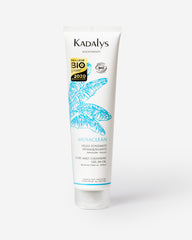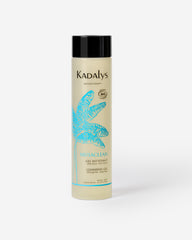
How to choose your cleanser based on your skin type?
The skin, your largest organ, deserves special attention and care. Each individual has a unique skin type, generally classified into five categories: oily, dry, combination, sensitive and normal. Understanding your skin type is crucial to choosing the right products. In this new article, we will guide you to diagnose your skin type and to find the cleanser perfectly suited to it.
SUMMARY
- How to diagnose your skin type?
- Problems associated with each skin type
- Learn how to choose your cleanser
How to diagnose your skin type
The diagnosis Knowing your skin type is a crucial step in developing an effective skincare routine. Understanding your skin type will help you choose the most appropriate products, such as cleansers, lotions and moisturizers. Here's how you can diagnose your skin type:
- Oily skin : it is characterized by excessive production of sebum , giving the skin an oily appearance. You can test this skin type using blotting paper. Apply it to your face, especially the T-zone (forehead, nose and chin), where oil production is often highest. If the paper absorbs a lot of oil, you likely have oily skin. People with oily skin may also notice more visible pores and a tendency to develop acne and blackheads .
- Dry skin : this type of skin often lacks hydration, which can give a feeling of tightness or roughness. If your skin feels tight after cleansing, and you notice flaking or redness , you may have dry skin. This skin type requires hydrating and nourishing products to restore balance and elasticity.
- Sensitive skin : it reacts easily to chemicals, fragrances and even temperature changes. It may be prone to redness , itching and irritation . If you find that your skin reacts negatively to various products or is easily irritated , you may have sensitive skin. It is best to opt for gentle products specially formulated for this skin type.
- Combination skin : Combination skin can be a little more complicated to diagnose because it combines the characteristics of several skin types. You may have oily skin in the T-zone and dry or normal skin on the rest of your face. Carefully assessing different areas of your face will help you determine if you have this skin type.
- Normal skin : if your skin is neither too dry nor too oily, and does not show any particular sensitivity, you probably have normal skin. This doesn't mean you should ignore skincare, but rather that you have greater flexibility in choosing products.
It should be noted that skin type can change over time, due to factors such as age, climate, diet and lifestyle habits. A regular consultation with a dermatologist can also provide professional insight into your skin type and appropriate care.
Problems associated with each skin type
Understanding the issues associated with each skin type is vital to applying a selection of suitable products. Here is a detailed breakdown of the specific challenges faced for different skin types:
Concerning oily skin , there is excessive production of sebum which can lead to a series of problems, including clogged pores , blackheads, and acne. Excess sebum can attract dirt and impurities, causing inflammation and skin infections.
For those with dry skin , dryness can lead to rough, flaky, and itchy skin. Without adequate hydration, dry skin can become sensitive and reactive, and may even crack and bleed. It may also show signs of premature aging , such as fine lines and lack of radiance .
Sensitive skin reacts easily to stimuli such as chemicals, fragrances, and weather changes. Common problems include redness , irritation, and inflammation.
Finally, managing combination skin can be tricky because it combines the characteristics of oily and dry skin. The T-zone may require mattifying products , while the cheeks may require hydration.
Skin type and associated issues can also be influenced by factors such as genetics, diet, stress, and skin care habits. A holistic approach that takes these elements into account may be more effective in managing specific skin concerns.
Learn how to choose your cleanser
Now that you know more about your skin type and its specific needs, let's see how to choose the perfect cleanser to pamper your skin:
If you have oily skin, opt for a cleanser that regulates sebum production without drying it out. Look for ingredients like clay, salicylic acid, or green tea oil that can help remove excess oil and impurities. We advise you to use our Organic Le Purifying Surgras Soap , a cold saponified solid soap which gently cleanses the skin and leaves it fresh and purified .
For dry skin , it is preferable to choose a hydrating and nourishing cleanser that does not alter the already weakened skin barrier. Cream-based cleansers containing ingredients such as sweet almond oil, glycerin, or shea butter can provide additional hydration. Avoid cleansers that contain alcohol or sulfates, as they can strip the skin's natural oils.
In case of sensitive skin , you should instead turn to gentle cleansers without harsh perfumes, dyes or preservatives. Soothing ingredients like aloe vera, chamomile, or oatmeal can reduce irritation and sensitivity. Formulated without soap to respect the skin's pH , our Cleansing Gel is ideal for sensitive skin. It purifies and cleanses the skin without irritating it thanks to ultra-gentle natural surfactants.
Regarding combination skin , it requires a gentle cleanser with light moisturizers, which can be ideal for cleansing without dehydrating dry areas or stimulating oily areas. Just like oily skin, we can recommend our Organic Le Purifying Surgras Soap which will gently cleanse your skin.







